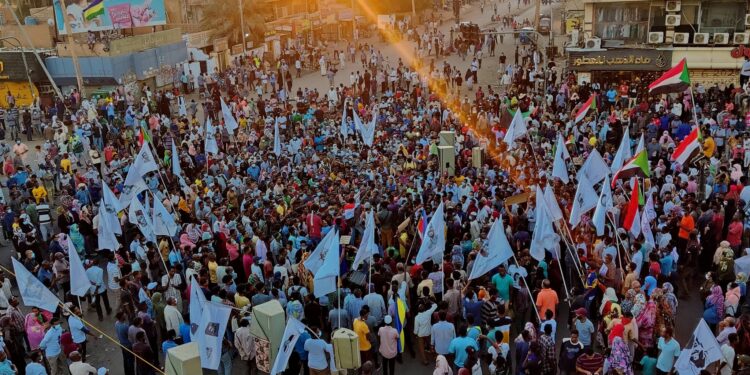The reinstatement of Prime Minister Abdalla Hamdok has not achieved its expected objective of calming tensions in Sudan’s cities by getting protesters off the streets.
Instead, the demonstrations have continued, with protesters renouncing the agreement that Hamdok signed with the military rulers who just a month ago threw him out of office and detained him in his home.
Although the international community was quick to welcome the return of the Prime Minister on Sunday, November 20, 2021, after the deal was signed, there were signs quiet early in the day that all was not well. The first was that protests did not abate, as demonstrators demanded the full withdrawal of the military from the governing of the country. They accused Hamdok of betrayal for cooperating with the military council, which had ousted him.
Then 12 cabinet ministers handed in their resignation in protest against the deal.
Pro-democracy activists have dismissed the agreement as an attempt to justify the coup, and vowed to continue resisting the continued presence of military men in the government.
Hamdok has acknowledged the tough road that lies ahead.
“I have made up my mind and signed this political agreement, although I know that many may disagree, object, or reject it simply because the people’s ambitions and aspirations were much higher,” he said during an interview on Al Jazeera.
On November 23, 2021, United States Secretary of State Antony Blinken stated that he had spoken with Hamdok and General Abdel Fattah Al-Burhan, the military council leader, and expressed support for initial steps to restore Sudan’s democratic transition. However, he underscored the work that remains to rebuild confidence with the Sudanese people.
In a joint statement issued on November 22, 2021, the Troika (Norway, the United Kingdom, and the United States), the European Union, Switzerland, and Canada welcomed the agreement to re-instate Prime Minister Hamdok as leader of a civilian-led transitional government, pending elections.
“We are encouraged by the renewed commitment to the 2019 Constitutional Declaration as the basis of the transition towards democracy. We welcome the release from house arrest of Dr Hamdok but urge the immediate release of all other political detainees, not only in Khartoum but in all parts of the country. These are all crucial steps towards restoring Sudan’s transition, constitutional order, and rule of law,” the statement said.
In a post on his official Twitter account on November 20, 2021, Blinken said he was encouraged by reports that talks in Khartoum would lead to the release of all political prisoners, the reinstatement of Prime Minister Hamdok, and the lifting of the state of emergency.
He further urged all sides to talk and redouble efforts to complete key transitional tasks on a civilian-led path to democracy. He reiterated the call for security forces to refrain from excessive force against peaceful protesters.
Josep Borrell, the High Representative of the European Union for Foreign Affairs and Security Policy, also welcomed the news and stated on his official Twitter account that it was the first step to bring the transition back on track.
“All detainees to be released; violence against demonstrators to be stopped,” he tweeted.
The international mission in Sudan also welcomed the news and called on both parties to urgently address outstanding issues to complete the transitional process.
African Union President Moussa Faki welcomed the Sudanese step towards returning to constitutional legitimacy and called on the parties to strive for national reconciliation.
Sudan’s General Burhan signed the deal on Sunday, November 20, 2021, which allowed Hamdok to restore the transition to civilian rule nearly a month after the coup.
But this has not impressed those opposed to the presence of military men.
“The deal does not represent the Sudanese people at all, nor does it represent the innocent blood shed,” said one protester.
The Forces of Freedom and Change (FFC), the political party that nominated Hamdok as the prime minister. rejected the deal.
“We affirm our clear and previously declared position that there is no negotiation, no partnerships, no legitimacy for the coup,” FFC said in a statement.
The deal has provided for the release of all political prisoners, including leader of the Sudanese Congress Party Omar Al-Digir, the deputy head of the Sudan People’s Liberation Movement-North Sector, Hamdok’s former adviser Yasser Arman, the head of the Sudanese Baath Party Ali Al-Sanhoury, and Al-Sydeeq Sadiq al-Mahdi from the Umma Party.
It also demands that the 2019 constitutional declaration be the basis for a political transition.
“We will continue to work towards preserving the transitional period until all your dreams of democracy, peace, and justice are achieved,” Burhan said, adding that Hamdok would lead an independent technocratic cabinet until elections can be held.
The deal follows weeks of worldwide calls to restore the transitional government.
Speaking during the signing of the new deal, Hamdok said the 14-point deal will help in relieving the external and internal obstruction and restoring the transition process towards a sustainable democracy.
He explained that he had signed the deal to save the country from more bloodshed, adding that it would restore the path to democratic transition and preserve the gains of the past two years.
The decision came after a month of negotiations and political unrest when the Sudanese military seized power on October 25, 2021, and dissolved the ruling Sovereign Council, arrested its civilian leaders, including Hamdok, and declared a state of emergency.
This sparked international condemnation and punitive measures, and provoked a wave of mass protests that led to at least 40 people being killed and more than 200 injured, according to a doctors’ group.
Hamdok was the first appointed prime minister in 2019 under the transitional government following the overthrow of Omar Al-Bashir.







